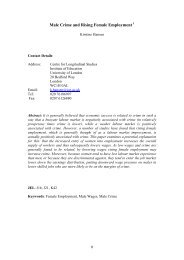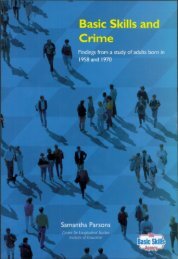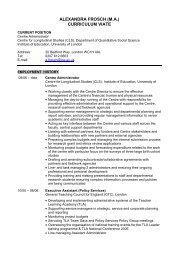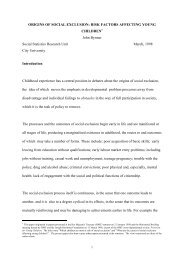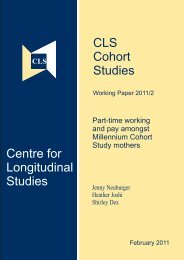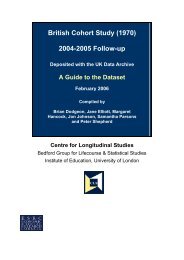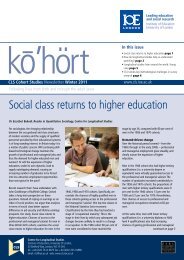Basic Skills and Social Exclusion - Centre for Longitudinal Studies
Basic Skills and Social Exclusion - Centre for Longitudinal Studies
Basic Skills and Social Exclusion - Centre for Longitudinal Studies
You also want an ePaper? Increase the reach of your titles
YUMPU automatically turns print PDFs into web optimized ePapers that Google loves.
<strong>Basic</strong> <strong>Skills</strong> <strong>and</strong> <strong>Social</strong> <strong>Exclusion</strong>Background to the researchOCIAI. ('X(111510fl IS (ha1l!1s(d a l°L UI JSU1 i(i lSUi U tI III III(' [ILIiH 1)Ina!Ic;Sol modern living: education, employment, community mity life <strong>and</strong> citizenship. Ofrelatively recent origin, the term represents a turning point in the way people areerceive(l who experience difficulties negotiating their way through the manyspect.s of' modern society (Atkinson <strong>and</strong> Hills, 1998). <strong>Social</strong> exclusion is nowviewed as a product rather than a cause of an inability to function effectively. Oneisadvantige rein<strong>for</strong>ces another producing a downward spiral of disadvantage tI lie periphery of a modern state. Fortunately, such exclusion po )cesses are not setii i stone. Against. prediction, many uiclividuals overcome adverse circumstances toh :1(1 successful socially integrated lives. We need to discover how the processes1 exclusion call reversed <strong>for</strong> individuals within disadvantaged groups - howredicte I failure becomes success <strong>and</strong> exclusion translorms into inclusion. TH."v:ives sustenance to policy initiatives designed to combat social exc]usi( IL IiMiwli the Government's <strong>Social</strong> <strong>Exclusion</strong> Unit has been at the <strong>for</strong>efront.\i ii a' core of the social exclusion process lies poor educational achie iiiwithin which the basic skills of literacy <strong>and</strong> niuneracy are the foundation. F'ailummeacquire the basic skills places individuals at a (Iisti]a'l disadvantage intiiiparison with their peers. Using data from the 1958 National Chih II Ievelopnient Study (NCDS) <strong>and</strong> the 1970 British Cohort, Study (BCS'ii I)previous research <strong>for</strong> the <strong>Basic</strong> <strong>Skills</strong> Agency (USA) examined 1)0th Illemimlecedents (Bynner <strong>and</strong> Steedman, 1995; Parsons <strong>and</strong> Byimner, 1998) <strong>and</strong>)nseql ieices (Ekinsmyth <strong>and</strong> Bymuer, 1994; Bymuier <strong>and</strong> Parsons, 1997) of poorI asic skills in adult life. A strong relationship between poor skills <strong>and</strong> factorsidentified with early risk in cluldhood has been consistently found. Poverty <strong>and</strong>disadvantage in childhood is associated with poor acquisition of early cognitivekills. Poor cognitive skills in childhood are strongly related to l mr I II 1;skills <strong>and</strong> with poverty, disadvantage <strong>and</strong> mmiarginalisalion in adult Iii''.To reduce the risk of adult social exclusion we need to be able to idt IL I\ j,(mat appear to 'fuel' or 'inhibit' it. The <strong>for</strong>mer include such relatively fixedI The National Child Development Study (NCDS) lia.s collected data on over 17,M) people burt I'igle week in 1958, <strong>and</strong> subsequently at ages 7, II, 16,23.33,37(10% sample) <strong>and</strong> 42. The 1970 lli'iri1I , hurt Study (BCS70), similarly began with a sample of over 17,001) people born in a single week in 1970,havo nit fi!Iiiwvil tip ill imtisi'iiiiriI irv ii :ig('t 5. ii). 16, I I 10 ':ini;iIt), h tiii'ii ninth



